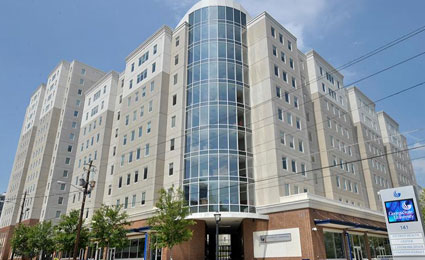
Georgia State University (GSU) is centered in historic downtown Atlanta. Its urban surroundings provide approximately 32,000 students with a distinguished education, as well as access to the city’s government, culture, and business organizations. The University is considered a commuter school with 61 percent of first-year students living on campus and 17 percent of all undergraduates living on campus.
Since 1913, the University has seen significant growth. GSU built its first student housing facility in 2007 and, since then, has continually built and expanded its student housing facilities to include five different locations and nine buildings for more than 4,000 students.
Roderick Padilla, assistant director of IT services at GSU and a 23-year veteran employee of the University, recalls a time when access control was just keys.
“Two decades ago, campus security was dramatically different,” Padilla said. “I remember when you would have keys out there and wouldn’t know who had them or how many people had the masters, the sub-masters and the sub-sub-masters. But, of course, with better IT and physical security, things have come a long way.”
Today, GSU has the largest campus police department of any school in the state with more than 100 employees. The challenge for the University is securing its urban campus, where students, as well as strangers, can walk the grounds.
Campus housing includes extensive surveillance equipment, turnstiles and gates to get into each facility, card readers in elevators to limit access to certain floors, and parking decks with readers and access gates.
With a growing student population, an urban environment, and increased incidents of campus and school violence around the country, campus security is particularly important at Georgia State.
GSU has a diverse mix of student housing locations to secure, which encompasses a variety of newly built and purchased conversions. An 1,100-occupancy dormitory named Piedmont North, for example, was once back-to-back hotels built for the 1996 Summer Olympics in Atlanta.
A Greek housing area with multiple buildings was built in 2010, and its first and largest dormitory called University Commons, (which was once named the 3rd Most Luxurious dormitory in the country by The Fiscal Times) houses 2,000 students and is open year round.
Challenge
Though keys have not been the primary source of access control in GSU’s housing facilities for some time, the University was looking to upgrade its existing access control system due to a number of issues, including lack of integration capabilities and product support.
?We really wanted to replace our proprietary system with an open source system–something that would work with all the cameras and other equipment we have,? said Padilla.
An open platform was particularly important to Padilla, as he wanted to limit the amount of equipment that would need to be replaced. The IT Services Department oversees a security area worth about $1.7 million in assets for student housing, including turnstiles, gates, 50 DVRs, more than 720 cameras, 25 access control panels and 150 card readers.
Solution
Working with a Tyco Security Products sales representative and GSU’s integrator of seven-plus years, LMI Systems, the department decided on Software House’s C.CURE 9000 security and event management system.
Because of its open platform design, most of the existing equipment the University had did not need to be replaced. The University could capitalize on its existing physical security and surveillance, as well as increase the capabilities of the system with better integration and features.
Some controllers were easily upgraded using Software House’s Legacy Controller Upgrade Kits, which allow legacy controllers to be updated to an iSTAR Edge controller, without replacing the existing wall mounts.
Source: asmag.com
